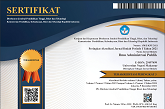The Influence of Leadership Style, Awards, and Punishment on Praja Discipline at the Institute of Domestic Government (IPDN) Campus in West Sumatra
(1) Institut Pemerintahan Dalam Negeri (IPDN), West Sumatra Campus, Indonesia
(2) Padang State University
(*) Corresponding Author
DOI: https://doi.org/10.26858/jiap.v11i2.20652
Abstract
This article is about the influence of leadership style, reward and punishment on civil service discipline at Institute Of Domestic Government (Institut Pemerintahan Dalam Negeri/IPDN) West Sumatra Campus. In addition, this article also discusses which variables have the most influence on civil service discipline. This research uses quantitative methods with explanatory quantitative research. The data collection technique used a questionnaire. The data analysis technique uses path analysis to see the causal relationship that begins with the classical assumption test and regression analysis with a Likert scale as the rating scale. The hypothesis will determine the contribution of the influence arising from one endogenous variable on an exogenous variable, either directly or indirectly. Overall, the results showed that leadership style had a positive and partial effect on reward, punishment and discipline. Rewards have a positive and partial effect on discipline. Punishment has a positive and partial effect on discipline. Leadership style through reward has an effect on discipline. Leadership style through punishment affects discipline. Leadership style, reward and punishment simultaneously influence discipline.
Keywords
Full Text:
PDFReferences
Jufri, M., Akib, H., Ridjal, S., Sahabuddin, R., & Said, F. (2018). Improving attitudes and entrepreneurial behaviour of students based on family environment factors at vocational high school in Makassar. Journal of Entrepreneurship Education, 21(2).
Lubis, F. R., & Hanum, F. (2020). Organizational culture. 2nd Yogyakarta International Conference on Educational Management/Administration and Pedagogy (YICEMAP 2019). Atlantis Press, 88–91.
Mammen, M., Köymen, B., & Tomasello, M. (2018). The reasons young children give to peers when explaining their judgments of moral and conventional rules. Developmental Psychology, 54(2), 254.
Miller, S. A., Beed, F. D., & Harmon, C. L. (2009). Plant disease diagnostic capabilities and networks. Annual Review of Phytopathology, 47, 15–38.
Mulhayat, S., Sampara, S., Nuh, M. S., & Baharuddin, H. (2019). The Definition of Discipline Punishment for Country Civil Apparatus in Operating Regional Government. Journal Of Humanities And Social Science, 1(2), 50–60.
Papalapu, D. M., Nawawi, J., Tahir, H., & Akib, H. (2016). The role of the department of social in empowering the street children in Makassar. International Journal of Economic Research, 13(1).
Rofiqoh, A. D. (2015). Improving The Students’writing Fluency Of The Tenth Grade Students At Sma N 5 Magelang In The Academic Year Of 2015/2016 Through The Use Of The Dialogue Journal Technique. Yogyakarta State University.
Saggaf, M. S., Wahyuddin, B. A., Akib, H., & Nasrullah, M. (2019). The Role of Principal Leadership in Vocational Schools Panca Sakti Makassar. Jurnal Office, 4(2), 53–62.
Sari, M. M. E. (2017). The role of learning management of Islamic boarding school (Pesantren) in improvement of their students religious tolerance in West Java-Indonesia. International Journal of Innovation and Applied Studies, 19(1), 24.
Sunarsi, D., & Erlangga, A. (2020). The Effect of Leadership Style and Work Environment on the Performance of Stationary Pump Operators in the Water Resources Office of West Jakarta City Administration. International Journal of Advances in Social and Economics, 2(3).
Sutrisno, S., & Sunarsi, D. (2019). The Effect of Work Motivation and Discipline on Employee Productivity at PT. Anugerah Agung in Jakarta. Jurnal Ad’ministrare, 6(2), 187–196.
Syam, A., Hasbiah, S., Yunus, M., & Akib, H. (2018). Determinants of entrepreneurship motivation for students at educational institution and education personnel in Indonesia. Journal of Entrepreneurship Education, 21(2).
Waltz, L. A., Muñoz, L., Weber Johnson, H., & Rodriguez, T. (2020). Exploring job satisfaction and workplace engagement in millennial nurses. Journal of Nursing Management, 28(3), 673–681.
Wawointana, T., Akib, H., Tahmir, S., & Kerebungu, F. (2016). Role of Local Institutions “Mapalus” as a Basis of Public Service in the Field of Security and Public Order in Minahasa, Indonesia. The Social Sciences, 11(13), 3370–3374.
Article Metrics
Abstract view : 252 times | PDF view : 59 timesRefbacks
- There are currently no refbacks.
Copyright (c) 2021 Jusmita, Aldri Frinaldi

This work is licensed under a Creative Commons Attribution 4.0 International License.
Diterbitkan oleh:
Program Studi Ilmu Administrasi Publik
Program Pascasarjana Universitas Negeri Makassar
JIAP Index By:

This work is licensed under a Creative Commons Attribution 4.0 International License.









